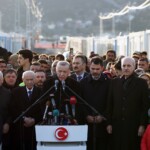For EU institutions divided over the wisdom of Turkish accession, President Erdoğan’s hostility towards the West has made it easier to blame the AKP for a decade-long impasse in relations – and avoid a searching debate about what Turkey’s long term relationship with the EU should be.
As Turkey faces the most important elections of the past two decades, a regional status quo that seemed stable even a year ago now looks up for grabs. Institutions dominated by the ruling AKP now face the possibility that entrenched systems of patronage could unravel within weeks of an opposition victory.
Even if the AKP ekes out a win or uses its administrative power to falsify results to keep President Erdoğan in power, the visible vulnerability of the established power structures would generate turmoil, as rival factions within the government and opposition maneuver for advantage in an unstable political system.
The listlessness of the AKP’s campaigning in the face of a more united opposition and the immense challenges the Turkish state faces betray a lack of strategic purpose within Erdogan’s power structures.
The devastating shock of the February 2023 earthquake, rampant inflation, containing PKK threats and sustaining a military position in Northern Syria represent strategic dilemmas for the Turkish state that will constrain the room for maneuver of Turkish governments for years to come.
The overwhelming nature of these challenges is also generating strains within the opposition coalition. Meral Aksener’s abandonment of the opposition “Table of Six” alliance over the choice of the CHP’s Kemal Kılıçdaroğlu was reversed after a few days, once her Iyi Party gained more influence over the opposition’s strategy.
But it indicates how difficult it will be for a post-AKP government to maintain a united coalition with such a broad range of ideologies and openly ambitious personalities.
The willingness of the HDP to not put forward its own presidential candidate will help Kılıçdaroğlu. Nevertheless, the struggle the CHP will face in balancing HDP demands, and those of its Kurdish voters, with the ferocious Turkish nationalism that the Iyi Party embodies, will inevitably generate tensions within any governing coalition that could paralyze the ability of a Kılıçdaroğlu presidency to implement the reforms needed to restore the rule of law and repair the Turkish economy.
The possibility of either an electoral defeat of the AKP, or the destabilization of its power structures, will also confront the EU with the underlying contradictions of its strategic approach to Turkey.
While the accession process managing Turkey’s application for full membership of the EU has remained in place, relations with President Erdoğan and the AKP have deteriorated over the past decade.
A delicate equilibrium in which the accession process remained nominally active—even as existing foundations of the EU-Turkey relations, such as the Customs Union, have stagnated—has emerged out of this resurgence of suspicion between Turkish and EU leaders.
From the beginning of negotiations in 2005, deep-seated reluctance among many in France and other EU states towards fully integrating a majority Muslim state has slowed down the accession process.
Such widespread xenophobia within the EU has its counterpart in the hostility among AKP and MHP ranks towards Western influences that the Turkish leadership from President Erdoğan down has declared a direct threat to Turkey’s great power ambitions.
The extent to which the domestic politics of Turkey and EU states have become intertwined with one another has heightened such tensions. Efforts by the AKP, MHP and HDP to mobilize support in the Turkish and Kurdish diasporas have stoked concerns within the EU about the disruptive impact the focus of such migrant communities on homeland politics might have on EU member states.
With elections in Turkey looming, open expressions of support by governing parties in the EU for the Turkish opposition through such initiatives as SPD General Secretary Lars Klingbeil’s recent meetings with Kemal Kılıçdaroğlu have been interpreted by President Erdoğan as hostile acts designed to promote regime change in Turkey.
For all the expressions of regret over the deterioration of EU-Turkey relations by leaders in Brussels and Ankara, this freezing of Turkey’s integration into the EU system has suited both sides.
Along with mobilizing the support of voters suspicious of Western influence, efforts to stoke tension with the EU over such issues as contested sea borders with Greece or conflicts within diaspora communities have enabled President Erdogan in his focus on consolidating his own grip on the state to row back from measures to strengthen the rule of law intrinsic to the EU accession process.
For EU institutions divided over the wisdom of Turkish accession, President Erdoğan’s hostility towards the West has made it easier to blame the AKP for a decade-long impasse in relations – and avoid a searching debate about what Turkey’s long term relationship with the EU should be.
The possibility that Turkish opposition parties that are less hostile to the West in principle might have a shot at taking power in elections is beginning to disrupt this policy stasis, which has made it too easy for the EU to indefinitely put off a reassessment of its strategy towards Turkey.
A CHP-led coalition government under Kemal Kılıçdaroğlu’s leadership would seek to improve relations with the EU and its member states – including Greece and Cyprus – as a key step towards stabilising Turkey’s economy and security.
Part of such a move towards closer relations with the EU is likely to entail requests for negotiations to update the Customs Union as well as an effort to reinvigorate accession talks in a quest to generate benefits for Turkish voters through investment, economic growth and visa-free travel access that the European integration process can offer.
Though Brussels would welcome the reduction in regional tensions such deeper trade and regulatory integration would offer, the revival of Turkey’s membership perspective and the easier access of Turkish citizens to European labour markets it would entail would revive debates over Turkey’s position in the EU system that Far Right populist parties might once again misuse to stoke anti-Muslim prejudice.
Finding a balance between building the foundations for Turkey’s integration into the EU Single Market while pushing back against a potential populist backlash driven by Far Right parties would be a tough challenge for EU institutions that still have not developed a clear consensus over how far Turkish integration into the EU system should go.
Moreover, relations between the EU and Turkey will continue to have points of tension even if the Turkish opposition wins the next elections.
For the opposition coalition to have a chance of victory, Meral Akşener and other Iyi Party leaders need to attract the votes of nationalist voters who back Turkish territorial claims in the Eastern Mediterranean that will continue to frustrate Greece and Cyprus.
Widespread hostility within Turkey towards Syrians that fled the civil war in their country has also led some in the CHP and Iyi Party to propose mass deportation of refugees to Syria that is likely to encourage many to flee to the EU instead.
The visceral hostility from the Iyi Party towards any concessions towards Kurdish political or cultural aspirations is likely to generate tensions with several pro-Kurdish EU governments as well as other parts of a new Turkish governing coalition.
Whether the opposition wins on 14 May or the AKP manages to cling on through manipulation of the electoral process, relations between the EU and Turkey are once again beginning to enter a period of fraught dynamism.
An escalation of conflict between supporters and opponents of President Erdoğan after a contested election result could generate instability within Turkey that through border, trade and diaspora links would have a swift impact on the EU.
A clear opposition victory would confront the EU with fundamental choices over Turkey’s place in European integration that EU governments have tried to evade for over a decade.
With only a few weeks to go before elections that could transform Turkey, policymakers throughout the EU need to engage more actively in debates over the direction they think relations between Ankara and Brussels should take.
Despite all the points of tension, a successful pathway to integration into the Single Market could help encourage a new Turkish governing coalition to pursue reforms that would strengthen the rule of law.
Without a policy consensus over relations in Turkey already in place, the EU might fail to react quickly enough to the pace of change in a strategically crucial neighbouring state.
The EU alone cannot determine Turkey’s future course. On 14 May it will be Turkish voters and institutions that will decide which New Turkey they will get.
Yet a more welcoming EU could still do much to help rebuild a more democratic Turkey. Though not without risk, the immense rewards of such strategic generosity would be a stronger Turkey as well as a more resilient EU.
The views and opinions expressed above are those of the author(s) and do not reflect those of the Free Turkish Press.


